Marketing in a Diverse World: UNIQLO's UAE Market Entry Strategy
VerifiedAdded on 2021/02/19
|13
|3576
|82
Report
AI Summary
This report provides a cross-cultural marketing analysis, focusing on UNIQLO's potential expansion into the United Arab Emirates (UAE). The report begins with an introduction to cross-cultural analysis and its importance in business, particularly when operating in diverse markets. It then explores the Hofstede Cultural Model, comparing the cultural dimensions of Japan (UNIQLO's origin) and the UAE, including individualism vs. collectivism, masculinity vs. femininity, and uncertainty avoidance. The report analyzes how these cultural differences influence consumer behavior and the marketing mix elements (product, price, promotion, place, process, physical evidence, and people). Finally, it discusses market entry strategies UNIQLO could employ to successfully enter the UAE market, considering the cultural nuances and potential challenges. The report aims to provide a comprehensive understanding of the cross-cultural marketing considerations essential for UNIQLO's expansion plans.
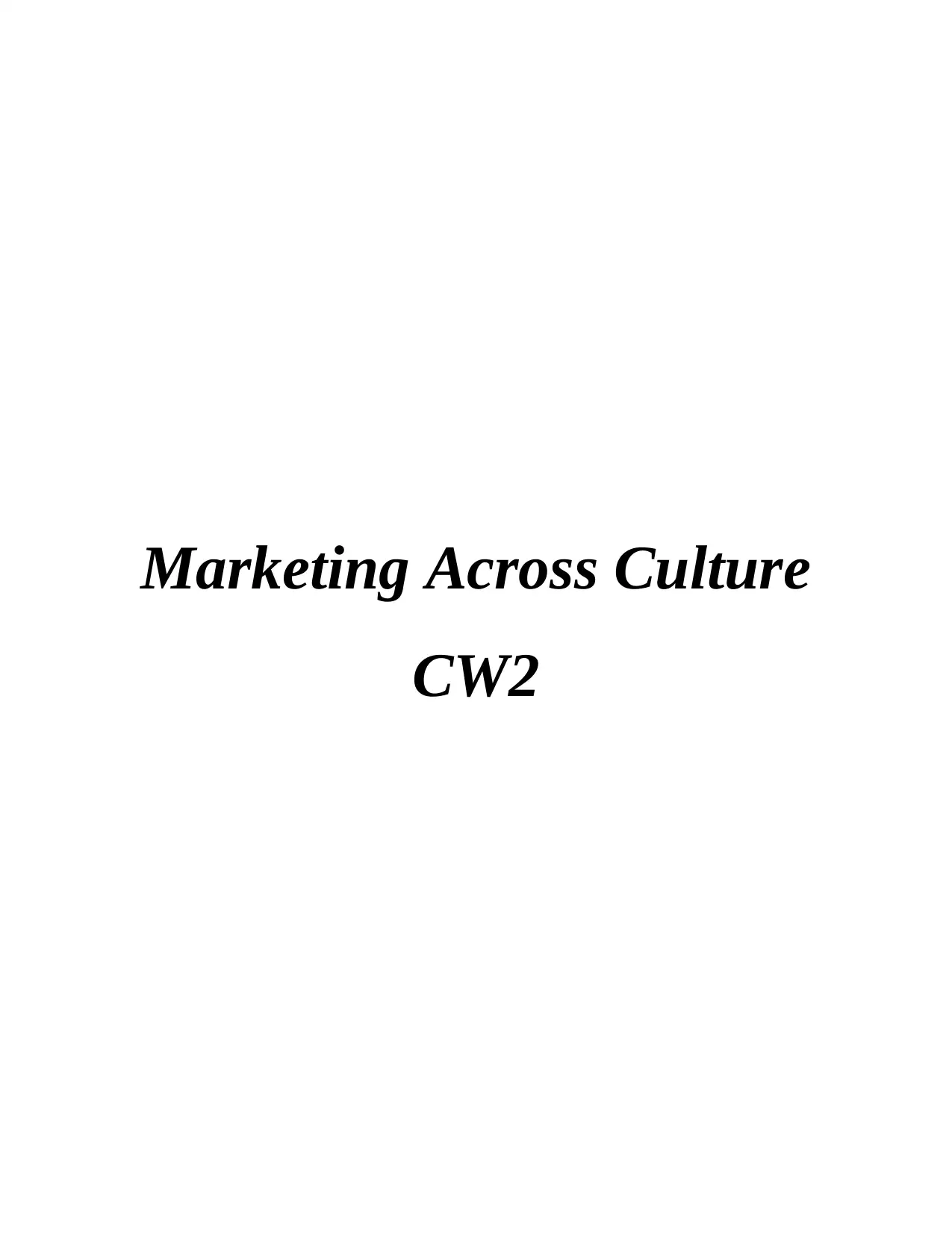
Marketing Across Culture
CW2
CW2
Paraphrase This Document
Need a fresh take? Get an instant paraphrase of this document with our AI Paraphraser
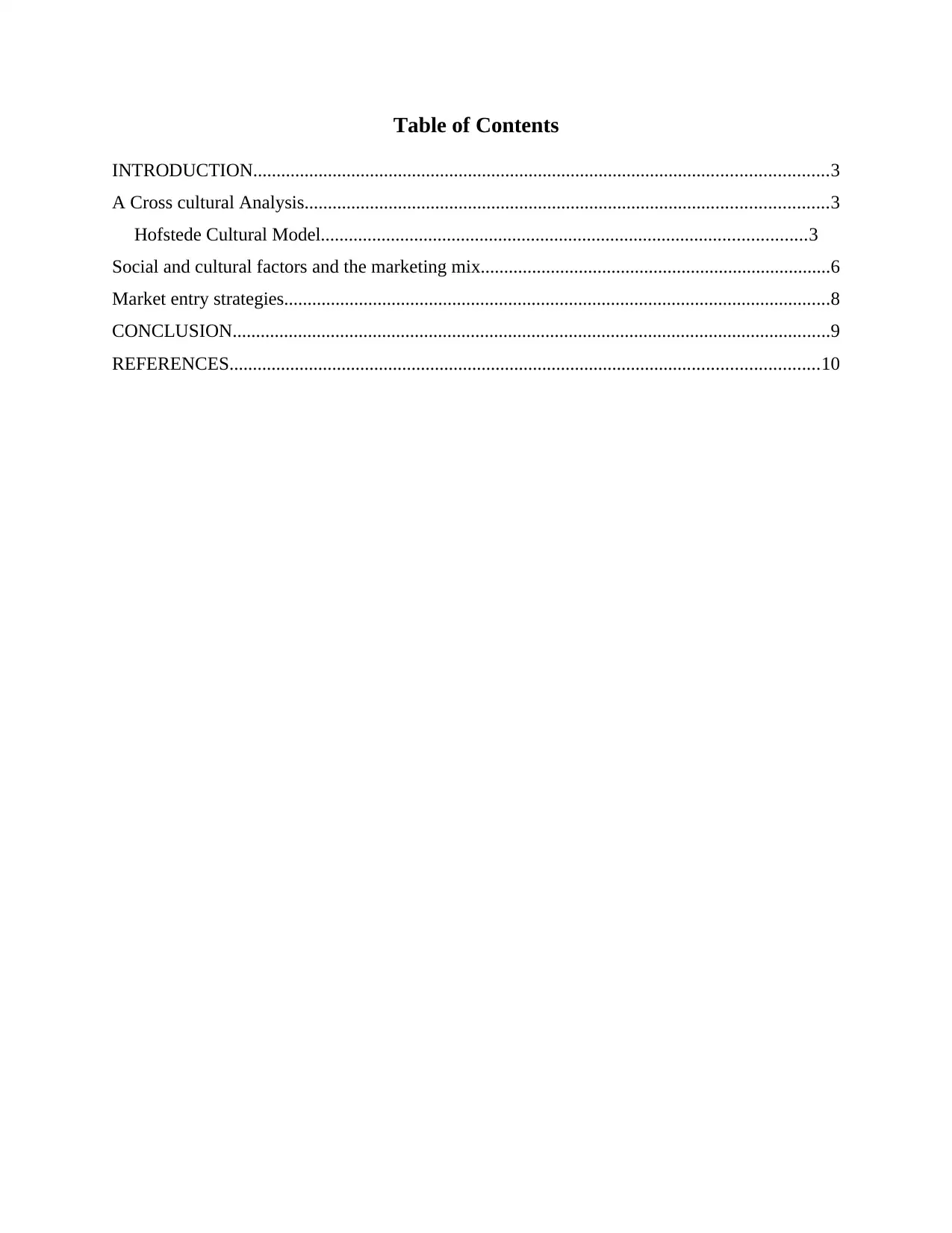
Table of Contents
INTRODUCTION...........................................................................................................................3
A Cross cultural Analysis................................................................................................................3
Hofstede Cultural Model........................................................................................................3
Social and cultural factors and the marketing mix...........................................................................6
Market entry strategies.....................................................................................................................8
CONCLUSION................................................................................................................................9
REFERENCES..............................................................................................................................10
INTRODUCTION...........................................................................................................................3
A Cross cultural Analysis................................................................................................................3
Hofstede Cultural Model........................................................................................................3
Social and cultural factors and the marketing mix...........................................................................6
Market entry strategies.....................................................................................................................8
CONCLUSION................................................................................................................................9
REFERENCES..............................................................................................................................10
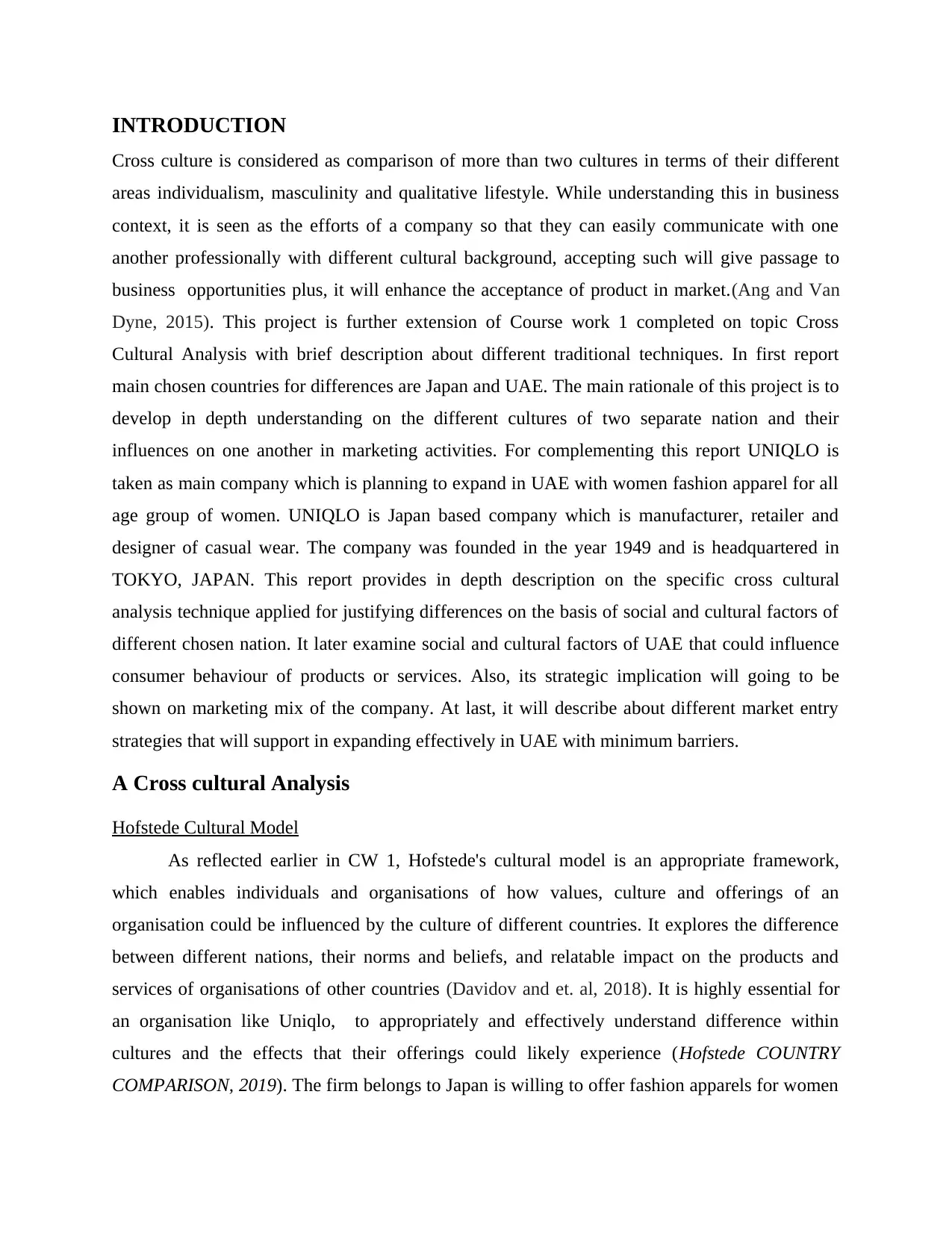
INTRODUCTION
Cross culture is considered as comparison of more than two cultures in terms of their different
areas individualism, masculinity and qualitative lifestyle. While understanding this in business
context, it is seen as the efforts of a company so that they can easily communicate with one
another professionally with different cultural background, accepting such will give passage to
business opportunities plus, it will enhance the acceptance of product in market.(Ang and Van
Dyne, 2015). This project is further extension of Course work 1 completed on topic Cross
Cultural Analysis with brief description about different traditional techniques. In first report
main chosen countries for differences are Japan and UAE. The main rationale of this project is to
develop in depth understanding on the different cultures of two separate nation and their
influences on one another in marketing activities. For complementing this report UNIQLO is
taken as main company which is planning to expand in UAE with women fashion apparel for all
age group of women. UNIQLO is Japan based company which is manufacturer, retailer and
designer of casual wear. The company was founded in the year 1949 and is headquartered in
TOKYO, JAPAN. This report provides in depth description on the specific cross cultural
analysis technique applied for justifying differences on the basis of social and cultural factors of
different chosen nation. It later examine social and cultural factors of UAE that could influence
consumer behaviour of products or services. Also, its strategic implication will going to be
shown on marketing mix of the company. At last, it will describe about different market entry
strategies that will support in expanding effectively in UAE with minimum barriers.
A Cross cultural Analysis
Hofstede Cultural Model
As reflected earlier in CW 1, Hofstede's cultural model is an appropriate framework,
which enables individuals and organisations of how values, culture and offerings of an
organisation could be influenced by the culture of different countries. It explores the difference
between different nations, their norms and beliefs, and relatable impact on the products and
services of organisations of other countries (Davidov and et. al, 2018). It is highly essential for
an organisation like Uniqlo, to appropriately and effectively understand difference within
cultures and the effects that their offerings could likely experience (Hofstede COUNTRY
COMPARISON, 2019). The firm belongs to Japan is willing to offer fashion apparels for women
Cross culture is considered as comparison of more than two cultures in terms of their different
areas individualism, masculinity and qualitative lifestyle. While understanding this in business
context, it is seen as the efforts of a company so that they can easily communicate with one
another professionally with different cultural background, accepting such will give passage to
business opportunities plus, it will enhance the acceptance of product in market.(Ang and Van
Dyne, 2015). This project is further extension of Course work 1 completed on topic Cross
Cultural Analysis with brief description about different traditional techniques. In first report
main chosen countries for differences are Japan and UAE. The main rationale of this project is to
develop in depth understanding on the different cultures of two separate nation and their
influences on one another in marketing activities. For complementing this report UNIQLO is
taken as main company which is planning to expand in UAE with women fashion apparel for all
age group of women. UNIQLO is Japan based company which is manufacturer, retailer and
designer of casual wear. The company was founded in the year 1949 and is headquartered in
TOKYO, JAPAN. This report provides in depth description on the specific cross cultural
analysis technique applied for justifying differences on the basis of social and cultural factors of
different chosen nation. It later examine social and cultural factors of UAE that could influence
consumer behaviour of products or services. Also, its strategic implication will going to be
shown on marketing mix of the company. At last, it will describe about different market entry
strategies that will support in expanding effectively in UAE with minimum barriers.
A Cross cultural Analysis
Hofstede Cultural Model
As reflected earlier in CW 1, Hofstede's cultural model is an appropriate framework,
which enables individuals and organisations of how values, culture and offerings of an
organisation could be influenced by the culture of different countries. It explores the difference
between different nations, their norms and beliefs, and relatable impact on the products and
services of organisations of other countries (Davidov and et. al, 2018). It is highly essential for
an organisation like Uniqlo, to appropriately and effectively understand difference within
cultures and the effects that their offerings could likely experience (Hofstede COUNTRY
COMPARISON, 2019). The firm belongs to Japan is willing to offer fashion apparels for women
⊘ This is a preview!⊘
Do you want full access?
Subscribe today to unlock all pages.

Trusted by 1+ million students worldwide
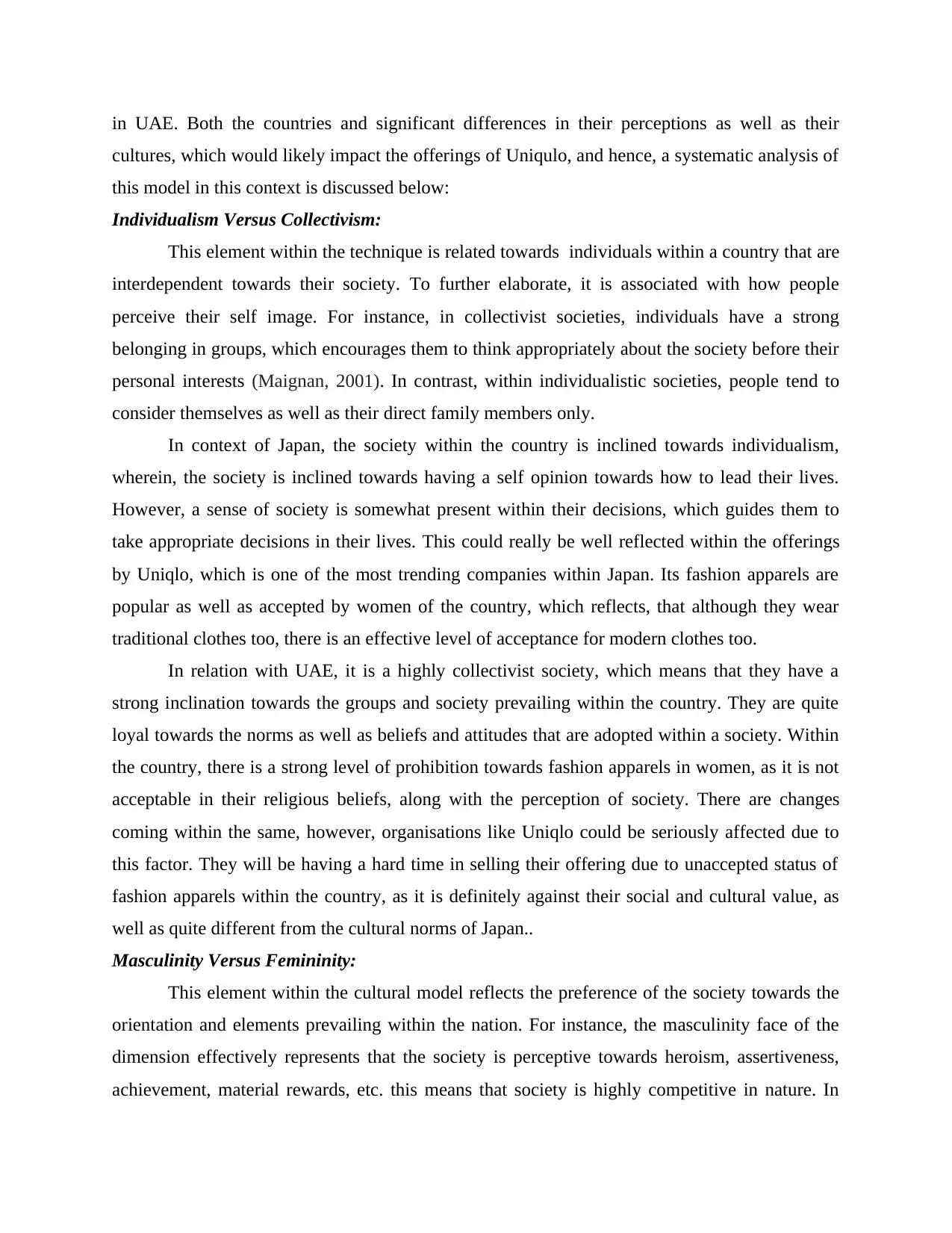
in UAE. Both the countries and significant differences in their perceptions as well as their
cultures, which would likely impact the offerings of Uniqulo, and hence, a systematic analysis of
this model in this context is discussed below:
Individualism Versus Collectivism:
This element within the technique is related towards individuals within a country that are
interdependent towards their society. To further elaborate, it is associated with how people
perceive their self image. For instance, in collectivist societies, individuals have a strong
belonging in groups, which encourages them to think appropriately about the society before their
personal interests (Maignan, 2001). In contrast, within individualistic societies, people tend to
consider themselves as well as their direct family members only.
In context of Japan, the society within the country is inclined towards individualism,
wherein, the society is inclined towards having a self opinion towards how to lead their lives.
However, a sense of society is somewhat present within their decisions, which guides them to
take appropriate decisions in their lives. This could really be well reflected within the offerings
by Uniqlo, which is one of the most trending companies within Japan. Its fashion apparels are
popular as well as accepted by women of the country, which reflects, that although they wear
traditional clothes too, there is an effective level of acceptance for modern clothes too.
In relation with UAE, it is a highly collectivist society, which means that they have a
strong inclination towards the groups and society prevailing within the country. They are quite
loyal towards the norms as well as beliefs and attitudes that are adopted within a society. Within
the country, there is a strong level of prohibition towards fashion apparels in women, as it is not
acceptable in their religious beliefs, along with the perception of society. There are changes
coming within the same, however, organisations like Uniqlo could be seriously affected due to
this factor. They will be having a hard time in selling their offering due to unaccepted status of
fashion apparels within the country, as it is definitely against their social and cultural value, as
well as quite different from the cultural norms of Japan..
Masculinity Versus Femininity:
This element within the cultural model reflects the preference of the society towards the
orientation and elements prevailing within the nation. For instance, the masculinity face of the
dimension effectively represents that the society is perceptive towards heroism, assertiveness,
achievement, material rewards, etc. this means that society is highly competitive in nature. In
cultures, which would likely impact the offerings of Uniqulo, and hence, a systematic analysis of
this model in this context is discussed below:
Individualism Versus Collectivism:
This element within the technique is related towards individuals within a country that are
interdependent towards their society. To further elaborate, it is associated with how people
perceive their self image. For instance, in collectivist societies, individuals have a strong
belonging in groups, which encourages them to think appropriately about the society before their
personal interests (Maignan, 2001). In contrast, within individualistic societies, people tend to
consider themselves as well as their direct family members only.
In context of Japan, the society within the country is inclined towards individualism,
wherein, the society is inclined towards having a self opinion towards how to lead their lives.
However, a sense of society is somewhat present within their decisions, which guides them to
take appropriate decisions in their lives. This could really be well reflected within the offerings
by Uniqlo, which is one of the most trending companies within Japan. Its fashion apparels are
popular as well as accepted by women of the country, which reflects, that although they wear
traditional clothes too, there is an effective level of acceptance for modern clothes too.
In relation with UAE, it is a highly collectivist society, which means that they have a
strong inclination towards the groups and society prevailing within the country. They are quite
loyal towards the norms as well as beliefs and attitudes that are adopted within a society. Within
the country, there is a strong level of prohibition towards fashion apparels in women, as it is not
acceptable in their religious beliefs, along with the perception of society. There are changes
coming within the same, however, organisations like Uniqlo could be seriously affected due to
this factor. They will be having a hard time in selling their offering due to unaccepted status of
fashion apparels within the country, as it is definitely against their social and cultural value, as
well as quite different from the cultural norms of Japan..
Masculinity Versus Femininity:
This element within the cultural model reflects the preference of the society towards the
orientation and elements prevailing within the nation. For instance, the masculinity face of the
dimension effectively represents that the society is perceptive towards heroism, assertiveness,
achievement, material rewards, etc. this means that society is highly competitive in nature. In
Paraphrase This Document
Need a fresh take? Get an instant paraphrase of this document with our AI Paraphraser
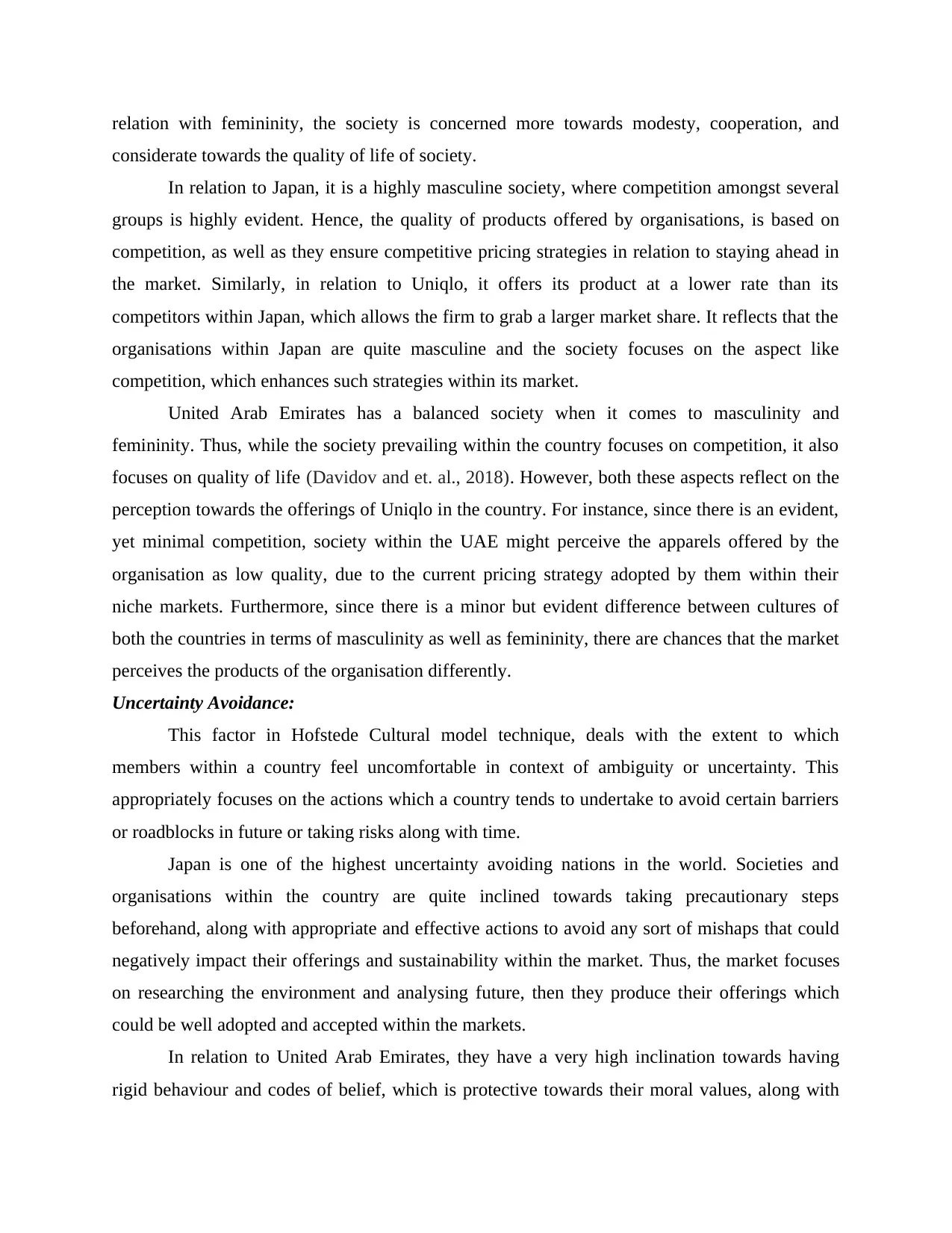
relation with femininity, the society is concerned more towards modesty, cooperation, and
considerate towards the quality of life of society.
In relation to Japan, it is a highly masculine society, where competition amongst several
groups is highly evident. Hence, the quality of products offered by organisations, is based on
competition, as well as they ensure competitive pricing strategies in relation to staying ahead in
the market. Similarly, in relation to Uniqlo, it offers its product at a lower rate than its
competitors within Japan, which allows the firm to grab a larger market share. It reflects that the
organisations within Japan are quite masculine and the society focuses on the aspect like
competition, which enhances such strategies within its market.
United Arab Emirates has a balanced society when it comes to masculinity and
femininity. Thus, while the society prevailing within the country focuses on competition, it also
focuses on quality of life (Davidov and et. al., 2018). However, both these aspects reflect on the
perception towards the offerings of Uniqlo in the country. For instance, since there is an evident,
yet minimal competition, society within the UAE might perceive the apparels offered by the
organisation as low quality, due to the current pricing strategy adopted by them within their
niche markets. Furthermore, since there is a minor but evident difference between cultures of
both the countries in terms of masculinity as well as femininity, there are chances that the market
perceives the products of the organisation differently.
Uncertainty Avoidance:
This factor in Hofstede Cultural model technique, deals with the extent to which
members within a country feel uncomfortable in context of ambiguity or uncertainty. This
appropriately focuses on the actions which a country tends to undertake to avoid certain barriers
or roadblocks in future or taking risks along with time.
Japan is one of the highest uncertainty avoiding nations in the world. Societies and
organisations within the country are quite inclined towards taking precautionary steps
beforehand, along with appropriate and effective actions to avoid any sort of mishaps that could
negatively impact their offerings and sustainability within the market. Thus, the market focuses
on researching the environment and analysing future, then they produce their offerings which
could be well adopted and accepted within the markets.
In relation to United Arab Emirates, they have a very high inclination towards having
rigid behaviour and codes of belief, which is protective towards their moral values, along with
considerate towards the quality of life of society.
In relation to Japan, it is a highly masculine society, where competition amongst several
groups is highly evident. Hence, the quality of products offered by organisations, is based on
competition, as well as they ensure competitive pricing strategies in relation to staying ahead in
the market. Similarly, in relation to Uniqlo, it offers its product at a lower rate than its
competitors within Japan, which allows the firm to grab a larger market share. It reflects that the
organisations within Japan are quite masculine and the society focuses on the aspect like
competition, which enhances such strategies within its market.
United Arab Emirates has a balanced society when it comes to masculinity and
femininity. Thus, while the society prevailing within the country focuses on competition, it also
focuses on quality of life (Davidov and et. al., 2018). However, both these aspects reflect on the
perception towards the offerings of Uniqlo in the country. For instance, since there is an evident,
yet minimal competition, society within the UAE might perceive the apparels offered by the
organisation as low quality, due to the current pricing strategy adopted by them within their
niche markets. Furthermore, since there is a minor but evident difference between cultures of
both the countries in terms of masculinity as well as femininity, there are chances that the market
perceives the products of the organisation differently.
Uncertainty Avoidance:
This factor in Hofstede Cultural model technique, deals with the extent to which
members within a country feel uncomfortable in context of ambiguity or uncertainty. This
appropriately focuses on the actions which a country tends to undertake to avoid certain barriers
or roadblocks in future or taking risks along with time.
Japan is one of the highest uncertainty avoiding nations in the world. Societies and
organisations within the country are quite inclined towards taking precautionary steps
beforehand, along with appropriate and effective actions to avoid any sort of mishaps that could
negatively impact their offerings and sustainability within the market. Thus, the market focuses
on researching the environment and analysing future, then they produce their offerings which
could be well adopted and accepted within the markets.
In relation to United Arab Emirates, they have a very high inclination towards having
rigid behaviour and codes of belief, which is protective towards their moral values, along with
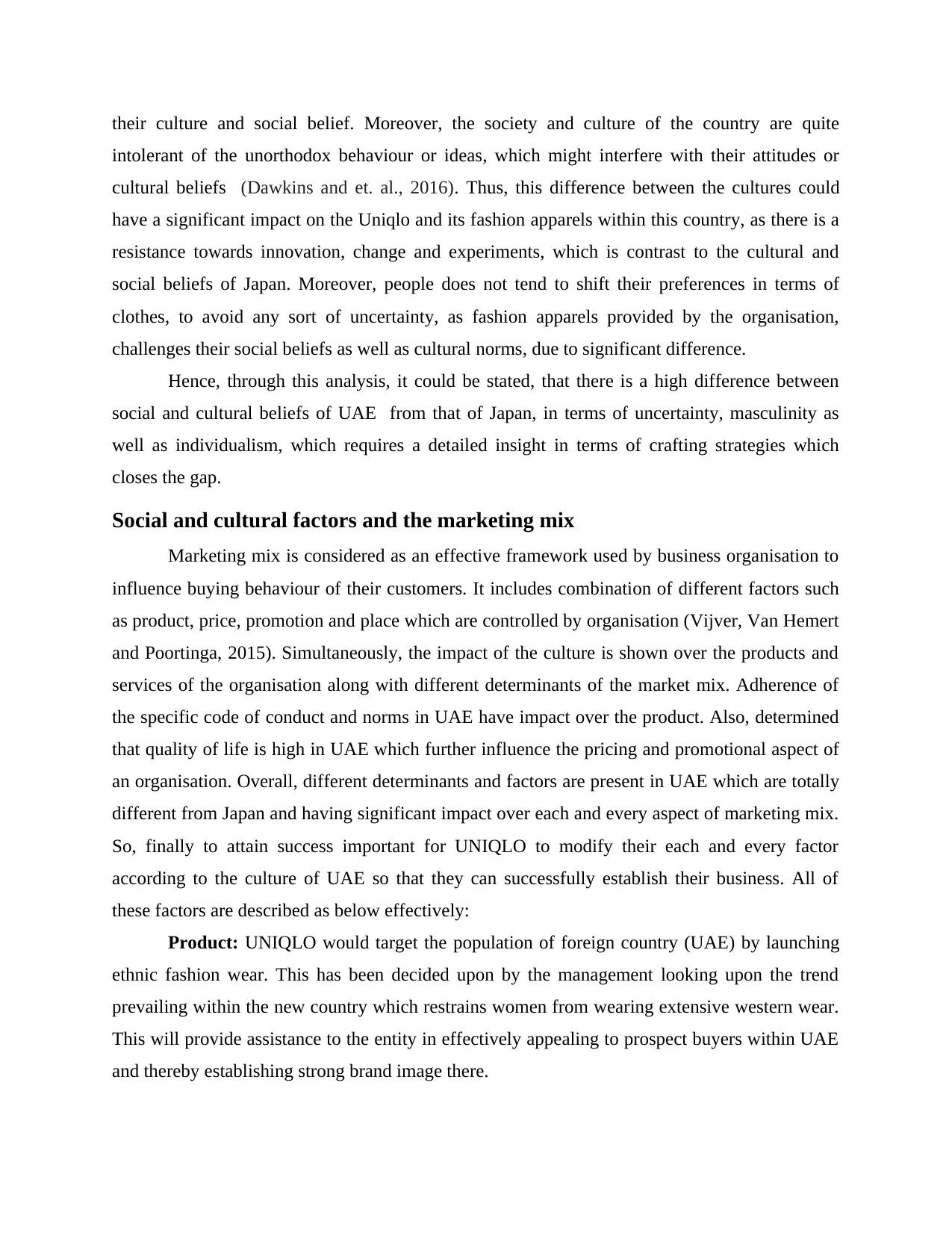
their culture and social belief. Moreover, the society and culture of the country are quite
intolerant of the unorthodox behaviour or ideas, which might interfere with their attitudes or
cultural beliefs (Dawkins and et. al., 2016). Thus, this difference between the cultures could
have a significant impact on the Uniqlo and its fashion apparels within this country, as there is a
resistance towards innovation, change and experiments, which is contrast to the cultural and
social beliefs of Japan. Moreover, people does not tend to shift their preferences in terms of
clothes, to avoid any sort of uncertainty, as fashion apparels provided by the organisation,
challenges their social beliefs as well as cultural norms, due to significant difference.
Hence, through this analysis, it could be stated, that there is a high difference between
social and cultural beliefs of UAE from that of Japan, in terms of uncertainty, masculinity as
well as individualism, which requires a detailed insight in terms of crafting strategies which
closes the gap.
Social and cultural factors and the marketing mix
Marketing mix is considered as an effective framework used by business organisation to
influence buying behaviour of their customers. It includes combination of different factors such
as product, price, promotion and place which are controlled by organisation (Vijver, Van Hemert
and Poortinga, 2015). Simultaneously, the impact of the culture is shown over the products and
services of the organisation along with different determinants of the market mix. Adherence of
the specific code of conduct and norms in UAE have impact over the product. Also, determined
that quality of life is high in UAE which further influence the pricing and promotional aspect of
an organisation. Overall, different determinants and factors are present in UAE which are totally
different from Japan and having significant impact over each and every aspect of marketing mix.
So, finally to attain success important for UNIQLO to modify their each and every factor
according to the culture of UAE so that they can successfully establish their business. All of
these factors are described as below effectively:
Product: UNIQLO would target the population of foreign country (UAE) by launching
ethnic fashion wear. This has been decided upon by the management looking upon the trend
prevailing within the new country which restrains women from wearing extensive western wear.
This will provide assistance to the entity in effectively appealing to prospect buyers within UAE
and thereby establishing strong brand image there.
intolerant of the unorthodox behaviour or ideas, which might interfere with their attitudes or
cultural beliefs (Dawkins and et. al., 2016). Thus, this difference between the cultures could
have a significant impact on the Uniqlo and its fashion apparels within this country, as there is a
resistance towards innovation, change and experiments, which is contrast to the cultural and
social beliefs of Japan. Moreover, people does not tend to shift their preferences in terms of
clothes, to avoid any sort of uncertainty, as fashion apparels provided by the organisation,
challenges their social beliefs as well as cultural norms, due to significant difference.
Hence, through this analysis, it could be stated, that there is a high difference between
social and cultural beliefs of UAE from that of Japan, in terms of uncertainty, masculinity as
well as individualism, which requires a detailed insight in terms of crafting strategies which
closes the gap.
Social and cultural factors and the marketing mix
Marketing mix is considered as an effective framework used by business organisation to
influence buying behaviour of their customers. It includes combination of different factors such
as product, price, promotion and place which are controlled by organisation (Vijver, Van Hemert
and Poortinga, 2015). Simultaneously, the impact of the culture is shown over the products and
services of the organisation along with different determinants of the market mix. Adherence of
the specific code of conduct and norms in UAE have impact over the product. Also, determined
that quality of life is high in UAE which further influence the pricing and promotional aspect of
an organisation. Overall, different determinants and factors are present in UAE which are totally
different from Japan and having significant impact over each and every aspect of marketing mix.
So, finally to attain success important for UNIQLO to modify their each and every factor
according to the culture of UAE so that they can successfully establish their business. All of
these factors are described as below effectively:
Product: UNIQLO would target the population of foreign country (UAE) by launching
ethnic fashion wear. This has been decided upon by the management looking upon the trend
prevailing within the new country which restrains women from wearing extensive western wear.
This will provide assistance to the entity in effectively appealing to prospect buyers within UAE
and thereby establishing strong brand image there.
⊘ This is a preview!⊘
Do you want full access?
Subscribe today to unlock all pages.

Trusted by 1+ million students worldwide
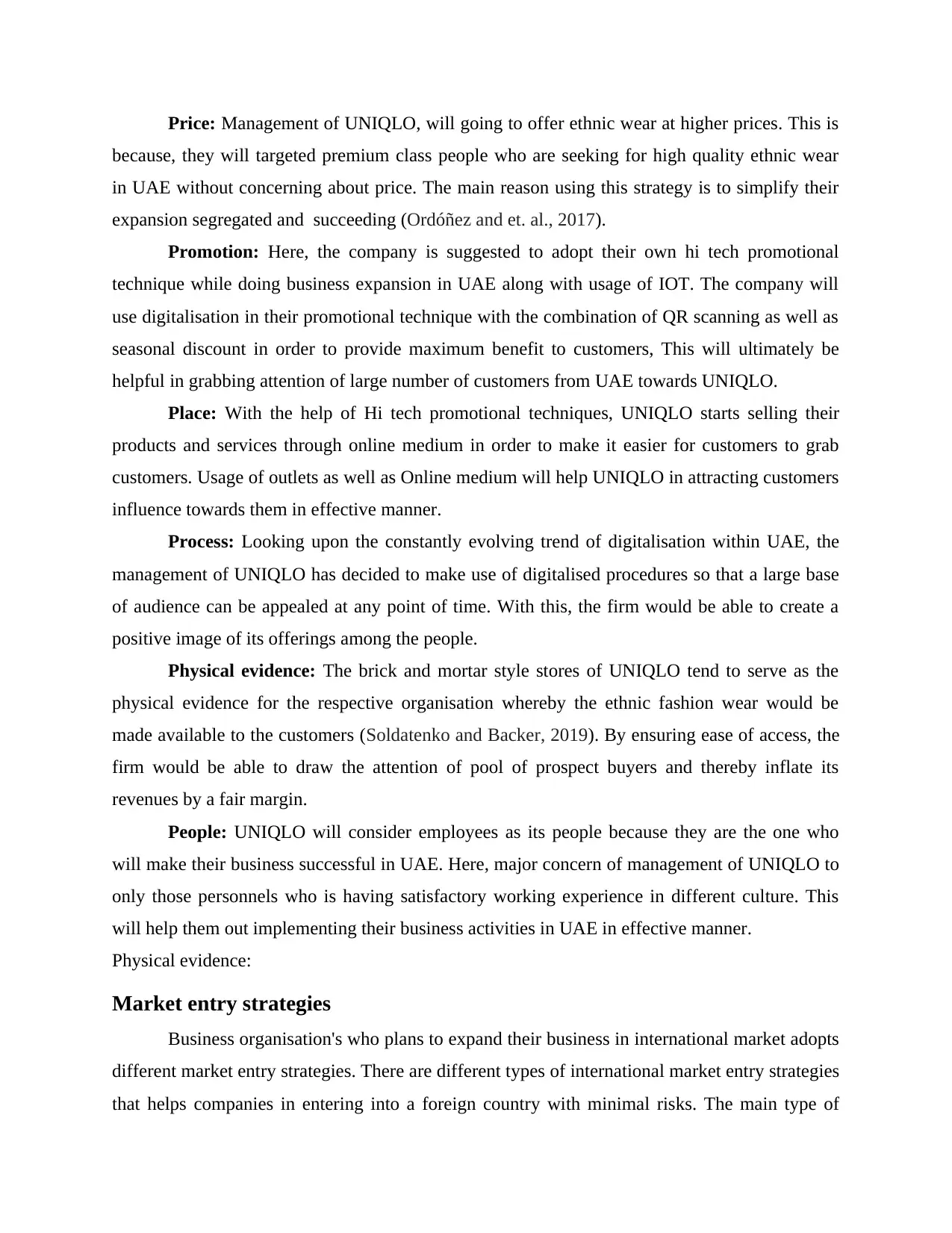
Price: Management of UNIQLO, will going to offer ethnic wear at higher prices. This is
because, they will targeted premium class people who are seeking for high quality ethnic wear
in UAE without concerning about price. The main reason using this strategy is to simplify their
expansion segregated and succeeding (Ordóñez and et. al., 2017).
Promotion: Here, the company is suggested to adopt their own hi tech promotional
technique while doing business expansion in UAE along with usage of IOT. The company will
use digitalisation in their promotional technique with the combination of QR scanning as well as
seasonal discount in order to provide maximum benefit to customers, This will ultimately be
helpful in grabbing attention of large number of customers from UAE towards UNIQLO.
Place: With the help of Hi tech promotional techniques, UNIQLO starts selling their
products and services through online medium in order to make it easier for customers to grab
customers. Usage of outlets as well as Online medium will help UNIQLO in attracting customers
influence towards them in effective manner.
Process: Looking upon the constantly evolving trend of digitalisation within UAE, the
management of UNIQLO has decided to make use of digitalised procedures so that a large base
of audience can be appealed at any point of time. With this, the firm would be able to create a
positive image of its offerings among the people.
Physical evidence: The brick and mortar style stores of UNIQLO tend to serve as the
physical evidence for the respective organisation whereby the ethnic fashion wear would be
made available to the customers (Soldatenko and Backer, 2019). By ensuring ease of access, the
firm would be able to draw the attention of pool of prospect buyers and thereby inflate its
revenues by a fair margin.
People: UNIQLO will consider employees as its people because they are the one who
will make their business successful in UAE. Here, major concern of management of UNIQLO to
only those personnels who is having satisfactory working experience in different culture. This
will help them out implementing their business activities in UAE in effective manner.
Physical evidence:
Market entry strategies
Business organisation's who plans to expand their business in international market adopts
different market entry strategies. There are different types of international market entry strategies
that helps companies in entering into a foreign country with minimal risks. The main type of
because, they will targeted premium class people who are seeking for high quality ethnic wear
in UAE without concerning about price. The main reason using this strategy is to simplify their
expansion segregated and succeeding (Ordóñez and et. al., 2017).
Promotion: Here, the company is suggested to adopt their own hi tech promotional
technique while doing business expansion in UAE along with usage of IOT. The company will
use digitalisation in their promotional technique with the combination of QR scanning as well as
seasonal discount in order to provide maximum benefit to customers, This will ultimately be
helpful in grabbing attention of large number of customers from UAE towards UNIQLO.
Place: With the help of Hi tech promotional techniques, UNIQLO starts selling their
products and services through online medium in order to make it easier for customers to grab
customers. Usage of outlets as well as Online medium will help UNIQLO in attracting customers
influence towards them in effective manner.
Process: Looking upon the constantly evolving trend of digitalisation within UAE, the
management of UNIQLO has decided to make use of digitalised procedures so that a large base
of audience can be appealed at any point of time. With this, the firm would be able to create a
positive image of its offerings among the people.
Physical evidence: The brick and mortar style stores of UNIQLO tend to serve as the
physical evidence for the respective organisation whereby the ethnic fashion wear would be
made available to the customers (Soldatenko and Backer, 2019). By ensuring ease of access, the
firm would be able to draw the attention of pool of prospect buyers and thereby inflate its
revenues by a fair margin.
People: UNIQLO will consider employees as its people because they are the one who
will make their business successful in UAE. Here, major concern of management of UNIQLO to
only those personnels who is having satisfactory working experience in different culture. This
will help them out implementing their business activities in UAE in effective manner.
Physical evidence:
Market entry strategies
Business organisation's who plans to expand their business in international market adopts
different market entry strategies. There are different types of international market entry strategies
that helps companies in entering into a foreign country with minimal risks. The main type of
Paraphrase This Document
Need a fresh take? Get an instant paraphrase of this document with our AI Paraphraser
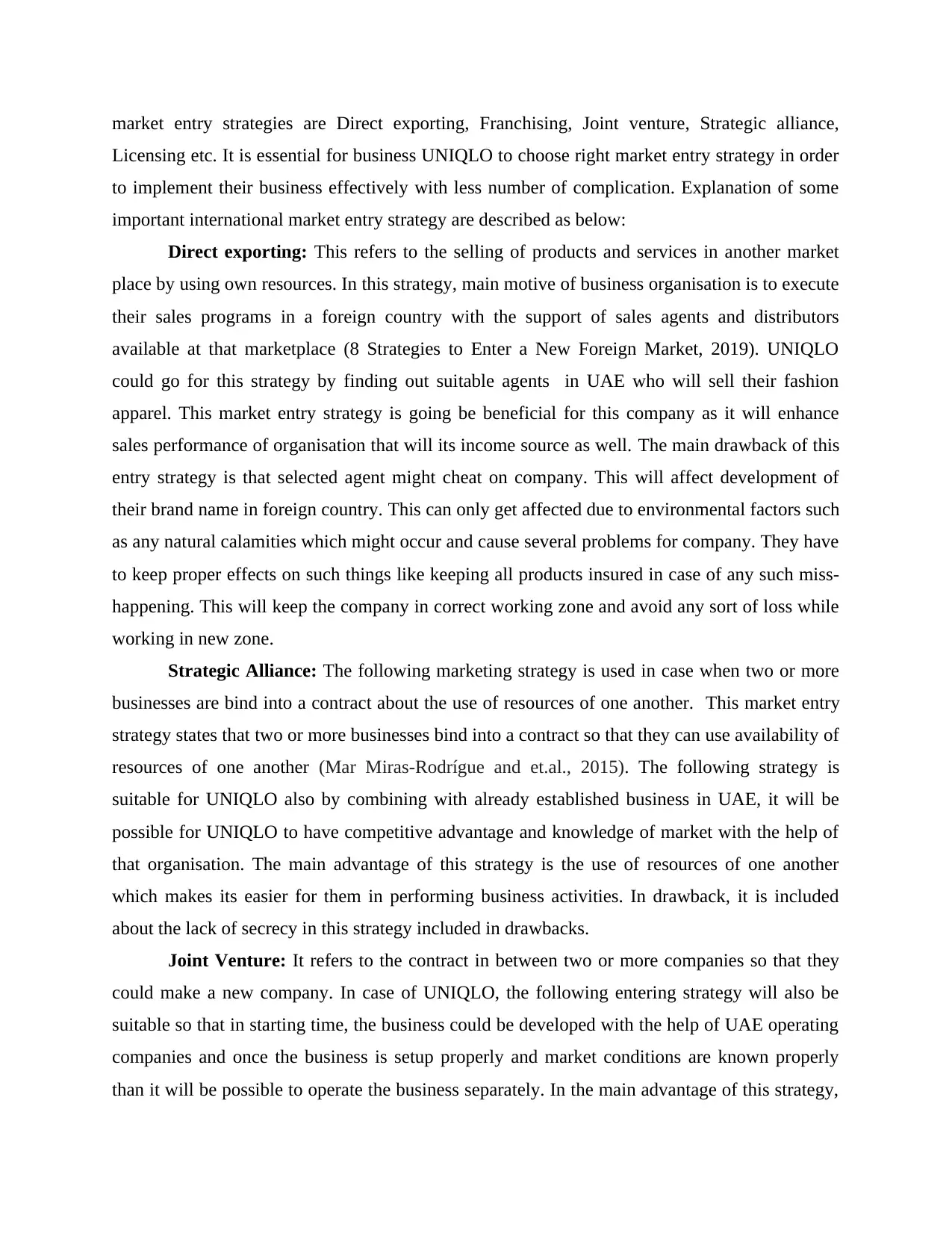
market entry strategies are Direct exporting, Franchising, Joint venture, Strategic alliance,
Licensing etc. It is essential for business UNIQLO to choose right market entry strategy in order
to implement their business effectively with less number of complication. Explanation of some
important international market entry strategy are described as below:
Direct exporting: This refers to the selling of products and services in another market
place by using own resources. In this strategy, main motive of business organisation is to execute
their sales programs in a foreign country with the support of sales agents and distributors
available at that marketplace (8 Strategies to Enter a New Foreign Market, 2019). UNIQLO
could go for this strategy by finding out suitable agents in UAE who will sell their fashion
apparel. This market entry strategy is going be beneficial for this company as it will enhance
sales performance of organisation that will its income source as well. The main drawback of this
entry strategy is that selected agent might cheat on company. This will affect development of
their brand name in foreign country. This can only get affected due to environmental factors such
as any natural calamities which might occur and cause several problems for company. They have
to keep proper effects on such things like keeping all products insured in case of any such miss-
happening. This will keep the company in correct working zone and avoid any sort of loss while
working in new zone.
Strategic Alliance: The following marketing strategy is used in case when two or more
businesses are bind into a contract about the use of resources of one another. This market entry
strategy states that two or more businesses bind into a contract so that they can use availability of
resources of one another (Mar Miras‐Rodrígue and et.al., 2015). The following strategy is
suitable for UNIQLO also by combining with already established business in UAE, it will be
possible for UNIQLO to have competitive advantage and knowledge of market with the help of
that organisation. The main advantage of this strategy is the use of resources of one another
which makes its easier for them in performing business activities. In drawback, it is included
about the lack of secrecy in this strategy included in drawbacks.
Joint Venture: It refers to the contract in between two or more companies so that they
could make a new company. In case of UNIQLO, the following entering strategy will also be
suitable so that in starting time, the business could be developed with the help of UAE operating
companies and once the business is setup properly and market conditions are known properly
than it will be possible to operate the business separately. In the main advantage of this strategy,
Licensing etc. It is essential for business UNIQLO to choose right market entry strategy in order
to implement their business effectively with less number of complication. Explanation of some
important international market entry strategy are described as below:
Direct exporting: This refers to the selling of products and services in another market
place by using own resources. In this strategy, main motive of business organisation is to execute
their sales programs in a foreign country with the support of sales agents and distributors
available at that marketplace (8 Strategies to Enter a New Foreign Market, 2019). UNIQLO
could go for this strategy by finding out suitable agents in UAE who will sell their fashion
apparel. This market entry strategy is going be beneficial for this company as it will enhance
sales performance of organisation that will its income source as well. The main drawback of this
entry strategy is that selected agent might cheat on company. This will affect development of
their brand name in foreign country. This can only get affected due to environmental factors such
as any natural calamities which might occur and cause several problems for company. They have
to keep proper effects on such things like keeping all products insured in case of any such miss-
happening. This will keep the company in correct working zone and avoid any sort of loss while
working in new zone.
Strategic Alliance: The following marketing strategy is used in case when two or more
businesses are bind into a contract about the use of resources of one another. This market entry
strategy states that two or more businesses bind into a contract so that they can use availability of
resources of one another (Mar Miras‐Rodrígue and et.al., 2015). The following strategy is
suitable for UNIQLO also by combining with already established business in UAE, it will be
possible for UNIQLO to have competitive advantage and knowledge of market with the help of
that organisation. The main advantage of this strategy is the use of resources of one another
which makes its easier for them in performing business activities. In drawback, it is included
about the lack of secrecy in this strategy included in drawbacks.
Joint Venture: It refers to the contract in between two or more companies so that they
could make a new company. In case of UNIQLO, the following entering strategy will also be
suitable so that in starting time, the business could be developed with the help of UAE operating
companies and once the business is setup properly and market conditions are known properly
than it will be possible to operate the business separately. In the main advantage of this strategy,
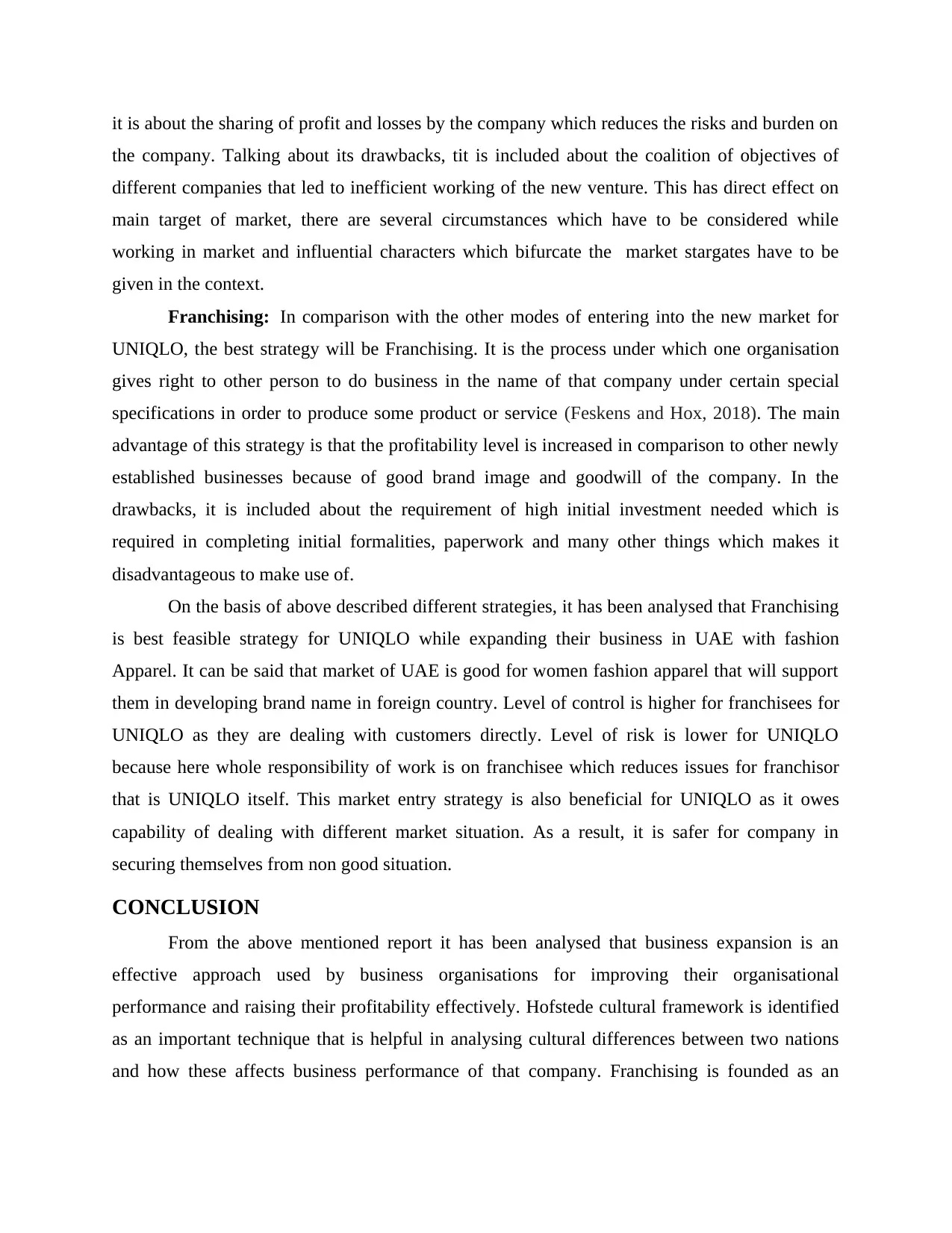
it is about the sharing of profit and losses by the company which reduces the risks and burden on
the company. Talking about its drawbacks, tit is included about the coalition of objectives of
different companies that led to inefficient working of the new venture. This has direct effect on
main target of market, there are several circumstances which have to be considered while
working in market and influential characters which bifurcate the market stargates have to be
given in the context.
Franchising: In comparison with the other modes of entering into the new market for
UNIQLO, the best strategy will be Franchising. It is the process under which one organisation
gives right to other person to do business in the name of that company under certain special
specifications in order to produce some product or service (Feskens and Hox, 2018). The main
advantage of this strategy is that the profitability level is increased in comparison to other newly
established businesses because of good brand image and goodwill of the company. In the
drawbacks, it is included about the requirement of high initial investment needed which is
required in completing initial formalities, paperwork and many other things which makes it
disadvantageous to make use of.
On the basis of above described different strategies, it has been analysed that Franchising
is best feasible strategy for UNIQLO while expanding their business in UAE with fashion
Apparel. It can be said that market of UAE is good for women fashion apparel that will support
them in developing brand name in foreign country. Level of control is higher for franchisees for
UNIQLO as they are dealing with customers directly. Level of risk is lower for UNIQLO
because here whole responsibility of work is on franchisee which reduces issues for franchisor
that is UNIQLO itself. This market entry strategy is also beneficial for UNIQLO as it owes
capability of dealing with different market situation. As a result, it is safer for company in
securing themselves from non good situation.
CONCLUSION
From the above mentioned report it has been analysed that business expansion is an
effective approach used by business organisations for improving their organisational
performance and raising their profitability effectively. Hofstede cultural framework is identified
as an important technique that is helpful in analysing cultural differences between two nations
and how these affects business performance of that company. Franchising is founded as an
the company. Talking about its drawbacks, tit is included about the coalition of objectives of
different companies that led to inefficient working of the new venture. This has direct effect on
main target of market, there are several circumstances which have to be considered while
working in market and influential characters which bifurcate the market stargates have to be
given in the context.
Franchising: In comparison with the other modes of entering into the new market for
UNIQLO, the best strategy will be Franchising. It is the process under which one organisation
gives right to other person to do business in the name of that company under certain special
specifications in order to produce some product or service (Feskens and Hox, 2018). The main
advantage of this strategy is that the profitability level is increased in comparison to other newly
established businesses because of good brand image and goodwill of the company. In the
drawbacks, it is included about the requirement of high initial investment needed which is
required in completing initial formalities, paperwork and many other things which makes it
disadvantageous to make use of.
On the basis of above described different strategies, it has been analysed that Franchising
is best feasible strategy for UNIQLO while expanding their business in UAE with fashion
Apparel. It can be said that market of UAE is good for women fashion apparel that will support
them in developing brand name in foreign country. Level of control is higher for franchisees for
UNIQLO as they are dealing with customers directly. Level of risk is lower for UNIQLO
because here whole responsibility of work is on franchisee which reduces issues for franchisor
that is UNIQLO itself. This market entry strategy is also beneficial for UNIQLO as it owes
capability of dealing with different market situation. As a result, it is safer for company in
securing themselves from non good situation.
CONCLUSION
From the above mentioned report it has been analysed that business expansion is an
effective approach used by business organisations for improving their organisational
performance and raising their profitability effectively. Hofstede cultural framework is identified
as an important technique that is helpful in analysing cultural differences between two nations
and how these affects business performance of that company. Franchising is founded as an
⊘ This is a preview!⊘
Do you want full access?
Subscribe today to unlock all pages.

Trusted by 1+ million students worldwide

effective market entry method that is helpful for company in business expansion with minimum
number of risks.
number of risks.
Paraphrase This Document
Need a fresh take? Get an instant paraphrase of this document with our AI Paraphraser
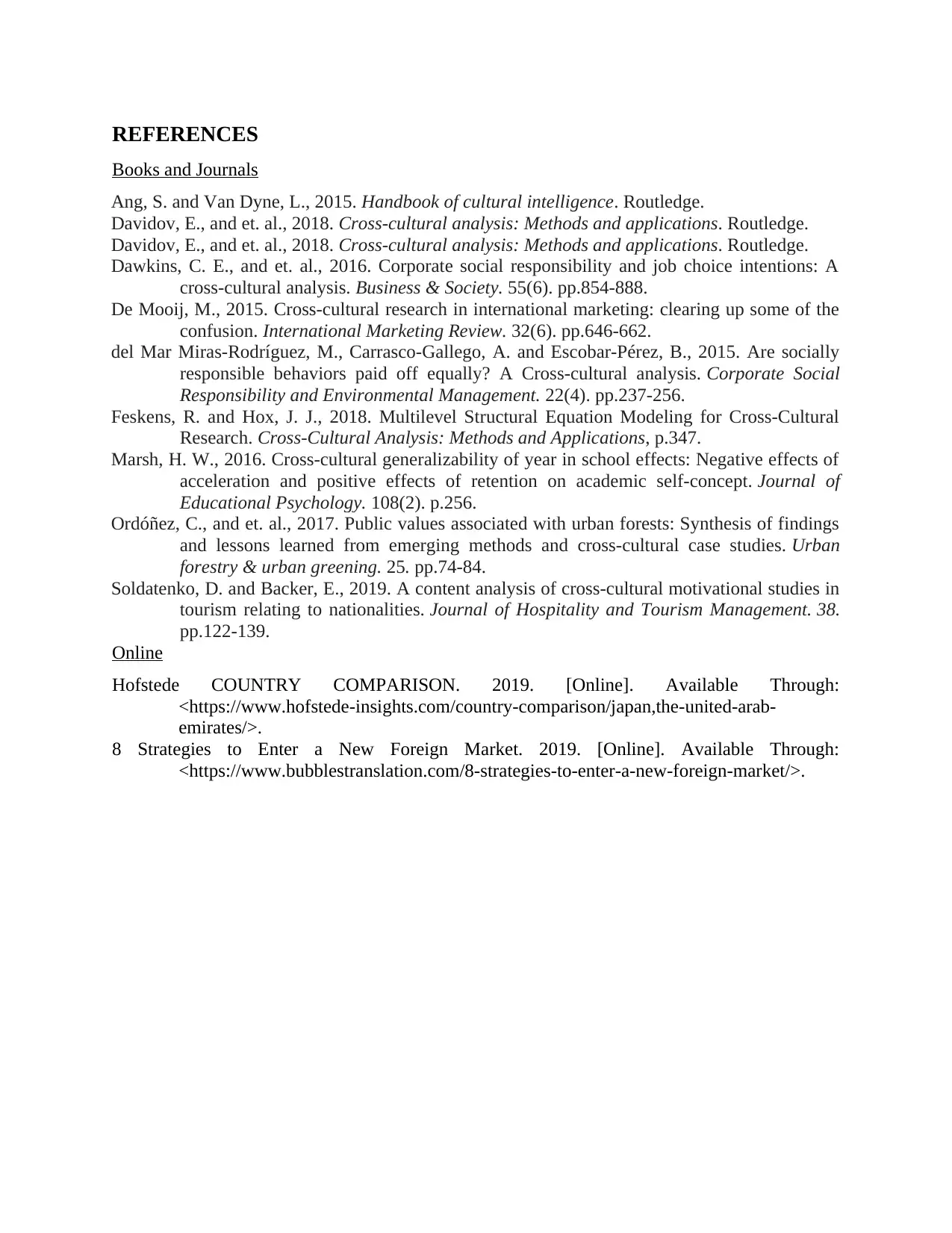
REFERENCES
Books and Journals
Ang, S. and Van Dyne, L., 2015. Handbook of cultural intelligence. Routledge.
Davidov, E., and et. al., 2018. Cross-cultural analysis: Methods and applications. Routledge.
Davidov, E., and et. al., 2018. Cross-cultural analysis: Methods and applications. Routledge.
Dawkins, C. E., and et. al., 2016. Corporate social responsibility and job choice intentions: A
cross-cultural analysis. Business & Society. 55(6). pp.854-888.
De Mooij, M., 2015. Cross-cultural research in international marketing: clearing up some of the
confusion. International Marketing Review. 32(6). pp.646-662.
del Mar Miras‐Rodríguez, M., Carrasco‐Gallego, A. and Escobar‐Pérez, B., 2015. Are socially
responsible behaviors paid off equally? A Cross‐cultural analysis. Corporate Social
Responsibility and Environmental Management. 22(4). pp.237-256.
Feskens, R. and Hox, J. J., 2018. Multilevel Structural Equation Modeling for Cross-Cultural
Research. Cross-Cultural Analysis: Methods and Applications, p.347.
Marsh, H. W., 2016. Cross-cultural generalizability of year in school effects: Negative effects of
acceleration and positive effects of retention on academic self-concept. Journal of
Educational Psychology. 108(2). p.256.
Ordóñez, C., and et. al., 2017. Public values associated with urban forests: Synthesis of findings
and lessons learned from emerging methods and cross-cultural case studies. Urban
forestry & urban greening. 25. pp.74-84.
Soldatenko, D. and Backer, E., 2019. A content analysis of cross-cultural motivational studies in
tourism relating to nationalities. Journal of Hospitality and Tourism Management. 38.
pp.122-139.
Online
Hofstede COUNTRY COMPARISON. 2019. [Online]. Available Through:
<https://www.hofstede-insights.com/country-comparison/japan,the-united-arab-
emirates/>.
8 Strategies to Enter a New Foreign Market. 2019. [Online]. Available Through:
<https://www.bubblestranslation.com/8-strategies-to-enter-a-new-foreign-market/>.
Books and Journals
Ang, S. and Van Dyne, L., 2015. Handbook of cultural intelligence. Routledge.
Davidov, E., and et. al., 2018. Cross-cultural analysis: Methods and applications. Routledge.
Davidov, E., and et. al., 2018. Cross-cultural analysis: Methods and applications. Routledge.
Dawkins, C. E., and et. al., 2016. Corporate social responsibility and job choice intentions: A
cross-cultural analysis. Business & Society. 55(6). pp.854-888.
De Mooij, M., 2015. Cross-cultural research in international marketing: clearing up some of the
confusion. International Marketing Review. 32(6). pp.646-662.
del Mar Miras‐Rodríguez, M., Carrasco‐Gallego, A. and Escobar‐Pérez, B., 2015. Are socially
responsible behaviors paid off equally? A Cross‐cultural analysis. Corporate Social
Responsibility and Environmental Management. 22(4). pp.237-256.
Feskens, R. and Hox, J. J., 2018. Multilevel Structural Equation Modeling for Cross-Cultural
Research. Cross-Cultural Analysis: Methods and Applications, p.347.
Marsh, H. W., 2016. Cross-cultural generalizability of year in school effects: Negative effects of
acceleration and positive effects of retention on academic self-concept. Journal of
Educational Psychology. 108(2). p.256.
Ordóñez, C., and et. al., 2017. Public values associated with urban forests: Synthesis of findings
and lessons learned from emerging methods and cross-cultural case studies. Urban
forestry & urban greening. 25. pp.74-84.
Soldatenko, D. and Backer, E., 2019. A content analysis of cross-cultural motivational studies in
tourism relating to nationalities. Journal of Hospitality and Tourism Management. 38.
pp.122-139.
Online
Hofstede COUNTRY COMPARISON. 2019. [Online]. Available Through:
<https://www.hofstede-insights.com/country-comparison/japan,the-united-arab-
emirates/>.
8 Strategies to Enter a New Foreign Market. 2019. [Online]. Available Through:
<https://www.bubblestranslation.com/8-strategies-to-enter-a-new-foreign-market/>.

⊘ This is a preview!⊘
Do you want full access?
Subscribe today to unlock all pages.

Trusted by 1+ million students worldwide
1 out of 13
Related Documents
Your All-in-One AI-Powered Toolkit for Academic Success.
+13062052269
info@desklib.com
Available 24*7 on WhatsApp / Email
![[object Object]](/_next/static/media/star-bottom.7253800d.svg)
Unlock your academic potential
Copyright © 2020–2026 A2Z Services. All Rights Reserved. Developed and managed by ZUCOL.





